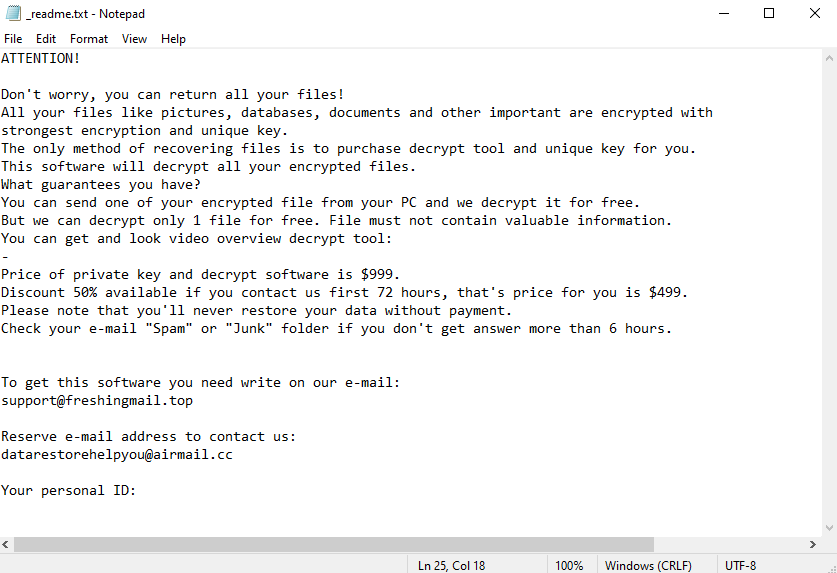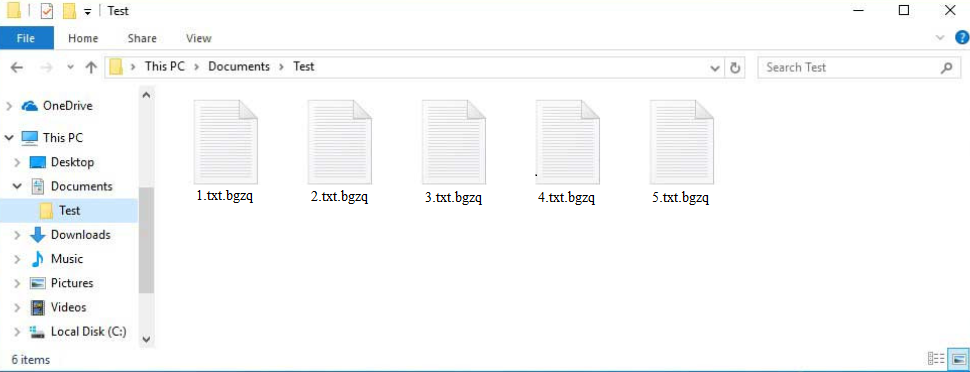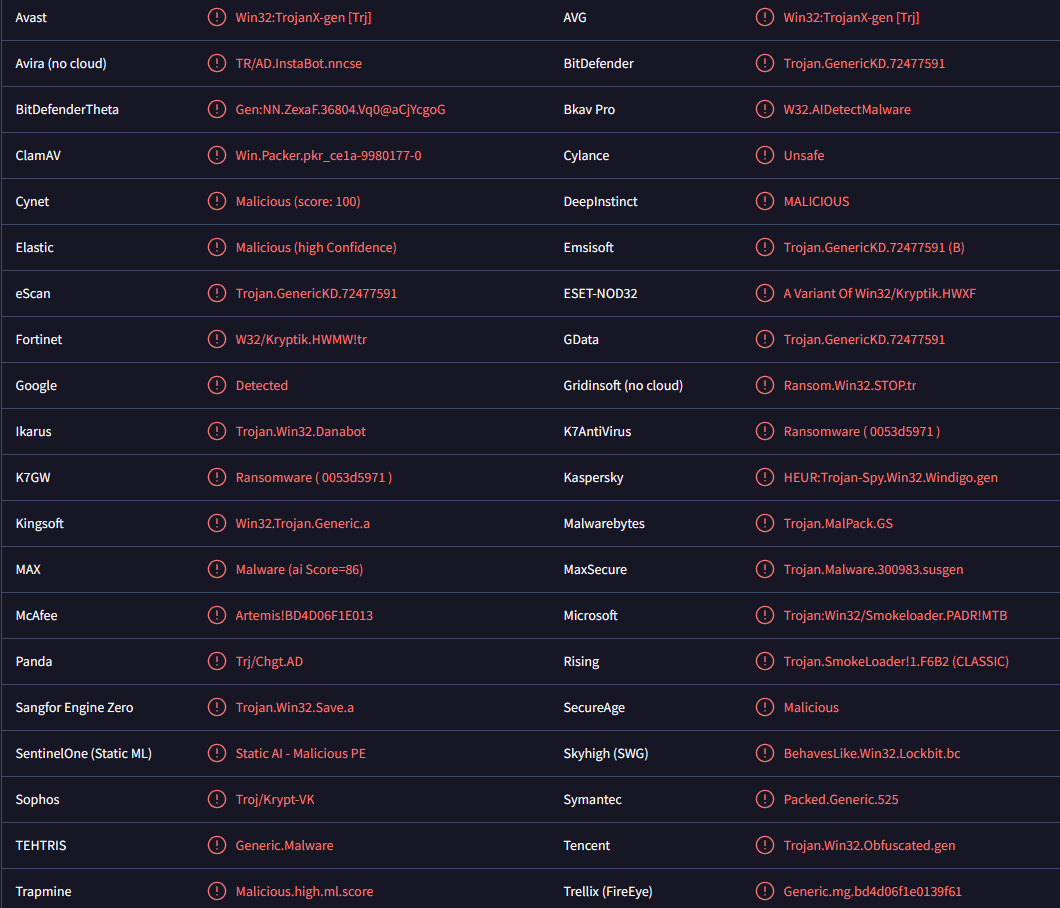How to remove Bgzq ransomware
Bgzq ransomware is malware from the Djvu/STOP ransomware family. It’s a type of malware that encrypts files and essentially takes them hostage. It’s a very dangerous infection because it’s not always possible to recover files.
Like all ransomware, Bgzq ransomware targets all personal files, including photos, videos, documents, etc. These are the files users are usually most willing to pay for so they are the main targets. Encrypted files will be very obvious because they will have the .bgzq extension added to them. For example, an encrypted 1.txt file would become 1.text.bgzq. Unfortunately, files with that extension will not be openable unless they are first decrypted.
When all targeted files are encrypted, Bgzq ransomware will drop a _readme.txt ransom note. The note is more or less identical to the ones dropped by all Djvu/STOP ransomware versions. It explains that files have been encrypted and how to acquire a decryptor. Unfortunately, users are asked to pay $999 for a decryptor. According to the note, there’s supposedly a 50% discount for users who make contact within the first 72 hours. Malicious actors also promise to decrypt one file for free as long as it does not contain any important information. That is supposed to work as proof that malware operators have a working decryptor.
Unfortunately, there are no guarantees that the cybercriminals will send the decryptor, which is why paying the ransom is not recommended. Users should keep in mind that ransomware operators are cybercriminals. There is nothing to force them to keep their end of the deal, and they often do not. Furthermore, the money victims pay goes towards future criminal activities.
ATTENTION!
Don’t worry, you can return all your files!
All your files like pictures, databases, documents and other important are encrypted with strongest encryption and unique key.
The only method of recovering files is to purchase decrypt tool and unique key for you.
This software will decrypt all your encrypted files.
What guarantees you have?
You can send one of your encrypted file from your PC and we decrypt it for free.
But we can decrypt only 1 file for free. File must not contain valuable information.
Do not ask assistants from youtube and recovery data sites for help in recovering your data.
They can use your free decryption quota and scam you.
Our contact is emails in this text document only.
You can get and look video overview decrypt tool:
–
Price of private key and decrypt software is $999.
Discount 50% available if you contact us first 72 hours, that’s price for you is $499.
Please note that you’ll never restore your data without payment.
Check your e-mail “Spam” or “Junk” folder if you don’t get answer more than 6 hours.To get this software you need write on our e-mail:
support@freshingmail.topReserve e-mail address to contact us:
datarestorehelpyou@airmail.ccYour personal ID:
Users who have a backup can connect to it and start recovering files as soon as they remove Bgzq ransomware from the computer. We strongly recommend using anti-malware software to delete Bgzq ransomware because it’s a serious infection and should be dealt with using a professional program. Manual Bgzq ransomware removal is not recommended because it could cause additional damage. When the ransomware is no longer detected, users can connect to their backups and start recovering files.
If users do not have a backup, waiting for a free Bgzq ransomware decryptor to be released is the only option. We recommend backing up encrypted files and occasionally checking NoMoreRansom for a free Bgzq ransomware decryptor.
How did Bgzq ransomware enter your computer?
If users are not familiar with the most common malware distribution methods and have bad browsing habits, they are much more likely to pick up an infection. One of the most effective ways of preventing an infection is to develop better browsing habits and learn how malware spreads. Generic malware is distributed via methods like email attachments, torrents, and malicious ads/links.
- Torrents
Torrents are an effective way of distributing malware because many users do not know what torrents with malware look like. Furthermore, torrent sites are often poorly moderated, which allows malicious actors to upload malicious torrents. Torrents for entertainment content (movies, TV series, video games, etc.) are the most likely to contain malware. So users who pirate copyrighted content using torrents are stealing content and putting their computers/data in danger.
- Email attachments
Email attachments are another common way to distribute malware. Malicious emails are often disguised to look like parcel delivery notifications or order confirmations, and senders claim that the attached files are important documents that need to be reviewed. Topics are usually money-related, which pressures users into opening the attachments. Fortunately, malicious emails are often quite obvious if users know what to look for. The biggest giveaway is often grammar and spelling mistakes. For whatever reason, generic malicious emails almost always contain various mistakes. It’s very rare to see mistakes in legitimate emails because they look unprofessional.
How an email addresses users can also help determine whether it’s legitimate. Legitimate emails from companies usually address their customers by name to make the email more personal. For example, if a company sends an order confirmation, it will use the customer’s name to address them. However, malicious emails usually use generic words like Customer, Member, and User to address users because they target a large number of users with the same email.
Some malicious emails may be more sophisticated, which is why it’s always recommended to scan all email attachments with anti-virus software or VirusTotal before opening them.
Bgzq ransomware removal
When it comes to ransomware, anti-malware software should always be used because it’s a complex infection. If users try to remove Bgzq ransomware manually, they could end up causing additional damage to their computers. If users have a backup, they should not connect to it unless they first fully delete Bgzq ransomware from the computer. If the ransomware is still present when users connect to their backups, the backed-up files would become encrypted as well. If that were to happen, they would be lost for good.
If users do not have a backup, the only option is to back up the encrypted files and wait for a free Bgzq ransomware decryptor to be released. If it does get released, it will be downloadable from NoMoreRansom. If it cannot be found on NoMoreRansom, it will not be available anywhere else. It should also be mentioned that downloading a fake decryptor could lead to another malware infection.
Bgzq ransomware is also detected as:
- Win32:TrojanX-gen [Trj] by Avast/AVG
- Trojan.GenericKD.72477591 by BitDefender
- A Variant Of Win32/Kryptik.HWXF by ESET
- HEUR:Trojan-Spy.Win32.Windigo.gen by Kaspersky
- Trojan.MalPack.GS by Malwarebytes
- Trojan:Win32/Smokeloader.PADR!MTB by Microsoft
Site Disclaimer
WiperSoft.com is not sponsored, affiliated, linked to or owned by malware developers or distributors that are referred to in this article. The article does NOT endorse or promote malicious programs. The intention behind it is to present useful information that will help users to detect and eliminate malware from their computer by using WiperSoft and/or the manual removal guide.
The article should only be used for educational purposes. If you follow the instructions provided in the article, you agree to be bound by this disclaimer. We do not guarantee that the article will aid you in completely removing the malware from your PC. Malicious programs are constantly developing, which is why it is not always easy or possible to clean the computer by using only the manual removal guide.



